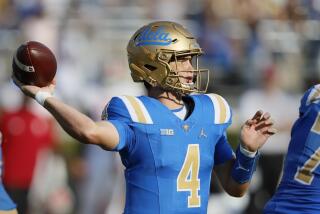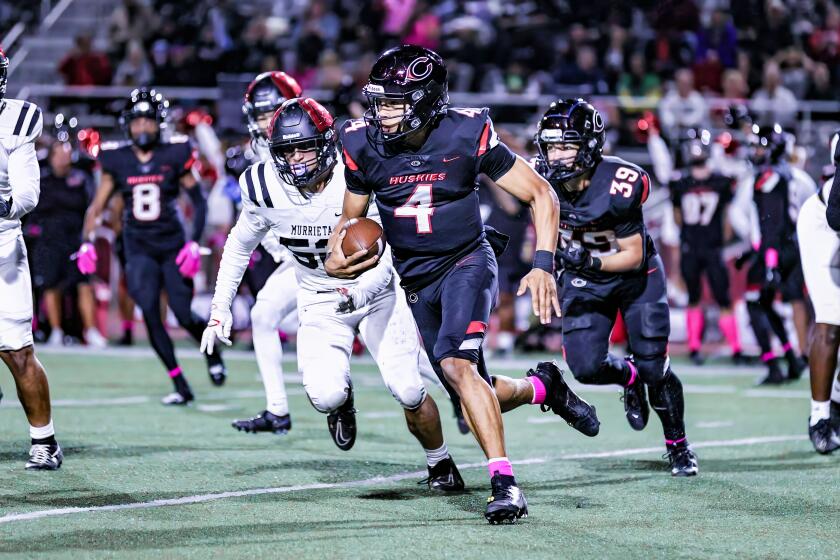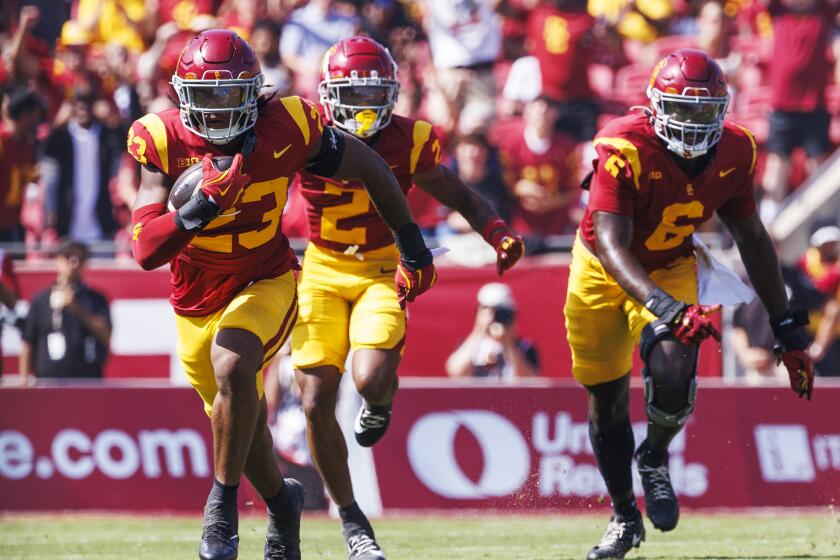Watching Her Dad From the Sidelines
George Allen was a superb football coach. His five-year record with the Los Angeles Rams in the late 1960s was 49-17-4. His seven-year record with the Washington Redskins was 67-30-1. He led the Redskins to Super Bowl VII, where they fell 14-7 to the unbeatable 1972 Miami Dolphins. Just before his death, in 1993 at age 73, Allen took over a hapless Cal State Long Beach squad and inspired it to finish 6-5. He never had a losing season.
Allen was also a caricature of a football coach. In a field teeming with workaholics and obsessives, he took the win-at-all-costs philosophy a step further than anyone else. His paranoia--could somebody be stealing his team’s plays?--rivaled that of Richard Nixon, who often phoned him from the White House. Allen built the Redskins a practice facility that had tighter security, he boasted, than CIA headquarters.
Allen had a wife, three sons and a daughter, whom he loved in his fashion but rarely saw because being around them distracted him from football. He noticed the sons, George, Gregory and Bruce, now and then, because they played the game. But the daughter, Jennifer, had no place in his world, though she hoped for a while to grow as big and strong as her brothers and become the first female NFL quarterback.
Instead, Jennifer Allen became a short-story writer (“Better Get Your Angel On”) and freelance journalist. She brings craft and restraint as well as personal experience to this memoir, which is marked by deadpan humor: “[Redskins owner Edward Bennett] Williams pegged his new coach as a Republican sympathizer when in fact my father had no political preference. He never even voted. Elections fell during football season.”
“Fifth Quarter” isn’t a “Mommie Dearest” or “The Great Santini.” It isn’t, in other words, written in anger. If George Allen habitually misspelled Jennifer’s name, if he once failed to recognize his wife, Etty, after a game and scolded her for cutting in front of the autograph line, he had no real meanness in him. If he willed himself to be one-dimensional, his daughter restores some of his lost complexity. If she suffered from neglect, she recognizes that she and her siblings--including the younger George, who became governor of Virginia--were stimulated by the drama and achievement of their father’s life.
Etty is the unexpected star of the book. A Tunisian-born Frenchwoman, she had a personality as powerful as her husband’s: “On good days, she looked a lot like Elizabeth Taylor.” An amateur architect, she designed a new house for each Allen move. She drank and smoked and swore, unlike George, who stuck to milk--he had bleeding ulcers--and whose strongest expletive was “cripes sakes.” She supported him but gave the family what it needed: a feminine outsider’s perspective.
The book opens after the 1969 season, when Jennifer was 8 and her father was fired--soon to be rehired--by Rams owner Dan Reeves. It ends in 1978, when Allen, back with the Rams, was fired by owner Carroll Rosenbloom after two exhibition losses and a player revolt. No other NFL team would hire him. Jennifer had come of age in a turbulent time in which her father’s’ pieties about suffering and sacrifice were an insufficient guide. Without coaching, he was lost. But by then, she says, “I did not want anything to do with him.”
Reconciliation came after George Allen’s death. Jennifer read his notebooks, to which he confided such thoughts as “I thought nobody wanted me.” She saw how growing up in poverty had left him with a mortal terror of losing. She realized that he would have admired her husband’s childhood struggle with disability, though it had nothing to do with football. Secure, finally, in her own testosterone-free identity, she regretted her impulse to “deny him for all the time I thought he had denied me. My father was not the loser. I was.”
More to Read
Go beyond the scoreboard
Get the latest on L.A.'s teams in the daily Sports Report newsletter.
You may occasionally receive promotional content from the Los Angeles Times.










